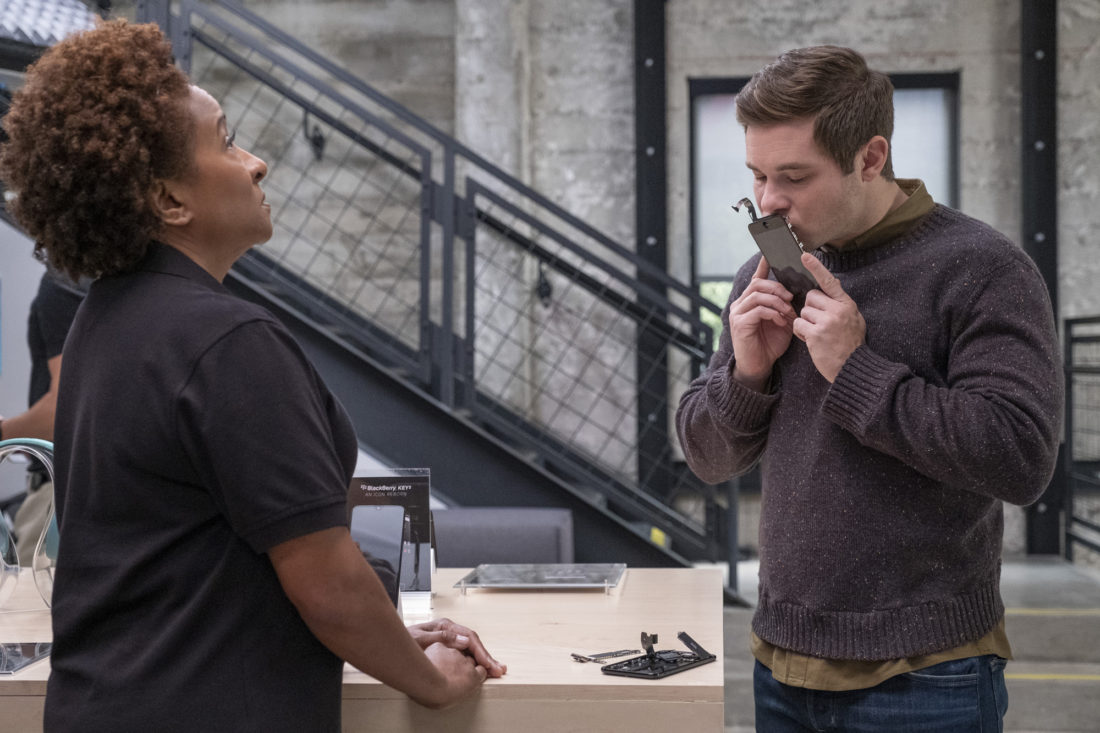Jexi is an odd paradigm of a film, failing to be one thing and becoming something better in the process.
The latest from the team of Jon Lucas and Scott Moore (Bad Moms) follows Phil (Adam Devine, Pitch Perfect), a screen addict with no friends or social life to speak of, who gets a phone programmed to make his life better. However, the titular device (voiced by Rose Byrne) is rude and crass to Phil, berating him at every turn while also forcing him into society via such methods as exposing his empty calendar to co-workers who invite him to play kickball and calling a woman he met on the street without giving him the option to hang up. But once things start to look bright for Phil, Jexi falls in love with him and proves she will do anything to keep them together.
Jexi is advertised as a comedy and tries too hard to fulfill the role, destroying nearly every comedic beat present in its nearly 90-minute run time. There’s a solid three minutes of Phil taking pictures of his penis to send to a girl who sent him a picture of her breasts — and it’s one of the most cringe-inducing scenes to come out of any movie this year. Characters meant to serve as standout comedic forces, such as Phil’s antagonistic boss Kai (Michael Peña) and phone salesperson Denise (Wanda Sykes), act as irritants to both him and the audience. Jexi is supposed to bring most of the comedy with her jabs at Phil and her commentary on other characters, but her “dialogue” feels too mean spirited to laugh at most of the time, wearing out its welcome very quickly. On the other end of the spectrum, when Jexi falls in love with Phil, her behavior is extremely toxic and tries to be played up for laughs.
Despite its comedic shortcomings, the film manages somewhat poignantly to explore how humans can be manipulated to stay in relationships when it’s healthier for them to be away from their partners. Jexi demands attention and refuses to let Phil leave her or have the opportunity to find a relationship with another human. This toxicity can be found in many romantic relationships (and even friendships), and Jexi does a huge service by finding a creative way of bringing this topic to its audience.
Phil’s progression throughout Jexi is also somewhat of an accomplishment on the filmmakers’ part. A likable person who just wants a normal and comfortable life, he’s always loved having a phone and doesn’t see a need for anything else, but after having Jexi, he slowly begins to realize there’s more to life. His transformation is an effective message about how change is possible with help. In an odd way, Jexi can be inspirational, but unless viewers look closely, they’re likely to miss it.
Regardless, the film is an absolute failure in the comedy department. Aside from a slight chuckle to a throwaway joke that I’ve since forgotten, there are no laughs to be had. Luckily, Jexi works in other ways, and whether these areas of success are intentional or not, they make it somewhat watchable.




Before you comment
The comments section is here to provide a platform for civil dialogue on the issues we face together as a local community. Xpress is committed to offering this platform for all voices, but when the tone of the discussion gets nasty or strays off topic, we believe many people choose not to participate. Xpress editors are determined to moderate comments to ensure a constructive interchange is maintained. All comments judged not to be in keeping with the spirit of civil discourse will be removed and repeat violators will be banned. See here for our terms of service. Thank you for being part of this effort to promote respectful discussion.